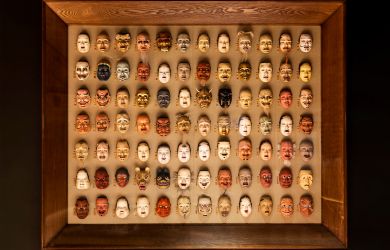
Originally published on metropolis.co.jp on February 2013

Back in London, coming into work with a cold was just another essential part of having the January blues. Christmas is over, it’s bloody freezing, you have no money and it’s likely at some point that you’ll spend a few days coughing and trying to stop nasal fluid dropping between the cracks of your keyboard. Such is life. Battle through the fever, dose yourself up to the eyeballs and ride it out. Anything is better than facing the wrath of the boss for thinking a cold was reason enough to call in sick. Unless you’re about to die or your leg’s hanging off, you get your ass into work and stop whining.
“Pah! Screw you, England!” I said. “I’m going to Japan where people care enough to wear weird white masks all the time, and the flu is a real thing.”
I was firm in my belief Japan would look after me should I fall into the clammy clutches of illness. I was right about one thing: The Japanese really do look after you if you’re sick. But I was wrong when I thought I’d enjoy it.
Last week I wandered into work a little under the weather. I mentioned to a co-worker I wasn’t feeling great, but that I’d bought some ridiculously over-priced medicine, drank my body weight in water and was sure I could struggle through (anything to avoid unpaid sick leave). Just as I’d thought, towards the end of the day I’d perked up a bit and was looking forward to heading home and sleeping it off. That was until my manager returned from a conference later in the evening. As many of you will know, there are no secrets in the Japanese workplace. Even the tatami mats have ears. Before I knew it, I was hauled into her office and told to go to the hospital.
“But I’m almost better,” I protested. “I’m definitely not sick enough to go to the hospital.”
It was no use. After twenty minutes of back and forth, a compromise was struck. If I was still sick in the morning, I’d go. Knowing I’d most likely be right as rain by then, I agreed.
As predicted, I woke up feeling fine. That was until I received the phone call. I was going to the hospital. Despite my insistence, I was told I couldn’t go into work until a doctor had cleared me.
My manager dragged me to the doctor’s office. I tried to convey I wasn’t sick anymore. I smiled, laughed, bowed relentlessly—but it was no use. After my jumbled Japanese/English combination made its way through my manager’s rather biased translation, I was ordered to bed for a week. A week! I didn’t have some new strain of the plague with the potential to wipe out humanity, yet I’d been banished to an eternity of unpaid sick leave. The white mask was thrust onto my face.
Though my manager and coworkers meant well, the Japanese predisposition towards the overcautious, combined with an unwavering faith in doctor’s orders can result in a tricky situation for a foreigner. Either confess your runny nose is a symptom of terminal illness and prepare yourself for hospitalization, or keep mum and blame that cough on one too many cigarettes at the izakaya last night.
Whatever you decide to do when the fever finally takes hold, know this: there’s no such thing as “just a little cold” in Japan.





